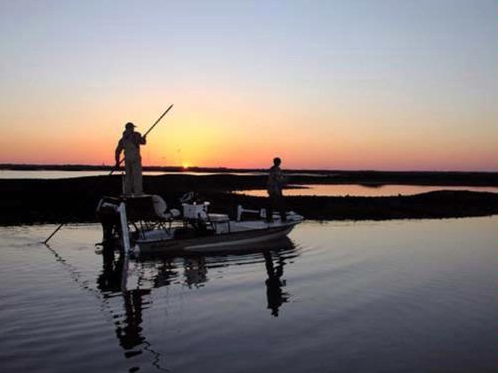Fishing is a great pursuit. It blends physical and recreational activities and spending time with friends and relatives. What should anybody ask for more than a day out with some friends on the boat? Fishing is still a vital survival ability in many areas of the world, on which people depend. In other regions, though, fishing is a recreational sport. Unfortunately, it doesn’t make things less complicated.
However, a slight semanticized variation, but crucial to remember as you pick your ride: Inland vs offshore fishing, but what actually is inshore fishing? And what is offshore fishing? And what is the difference?
Looking for Fish Finder? Best Fish Finder for the Money Best Kayak Fish Finder Best Portable Fish Finder Best Ice Fishing Fish Finder Best Small Boat Fish Finder
Inshore vs Offshore fishing
Deep-sea fishing is most often referred to as offshore fishing. However, it includes some fishing undertook more than nine kilometers from the sea. Deep-sea fishing typically takes place in the fishing grounds 20-30 miles from land. The waters are thousands of feet deep, which is why the term. As you may have guessed, coastal fishing is fishing less than nine miles out from the coast. Both saltwater flats, bays, and Estuary are included.
The distinction between the two is essential. The types of fish vary in coastal or offshore fishing. But, as if you’re trying to catch the big blue marlins and sailfish, offshore is where you’ll find them.
Naturally, you would require a boat for both types of fishing. However, you won’t require one as wide with inshore. Usually, they are smaller and quicker.
Offshore vessels are the bigger boats for sports fishing and will take the open sea. Weather and seasons rely on offshore fishing. First, you decide what kind of fish you’re going to eat. Big game fish are migratory and pursue the baitfish for several periods in certain regions. Inshore fish are usually seen all year long, and you know what to find almost all the time on the fishing grounds. Regardless of the kind of cruise or charter you are on, it would be the right thing to tackle for whatever type of fish you catch.

Pros and Cons
Ok, now, let’s determine the differences and the most significant variations depending on how far you move away from the coast.
Offshore fishing (or deep-sea fishing) is primarily characterized as fishing of any kind that is more than 9 miles from the shoreline. You usually are very far from land when you fish deep-sea… approximately 20-30 miles, in water that’s hundreds or even thousands of meters deeper. It is why it’s called “deep-sea diving.”
On the other side, coastal fishing is only 9 miles from the shoreline. Thus, Estuary, bays, and saltwater flats are sometimes incorrectly listed as the only common maritime fishing sites, but Offshore fishing, as discussed just now, often refers to anything within 9 miles.
Why do we like inshore fishing? Since you don’t waste half your journey (or money) to and from your fishing hole.
There are six other points here that help you determine which fishing style is suitable for you and your budget. As we know, money is a significant factor in everything, and fishing is no different.

Inshore
- motorboats bigger, quicker, canoes and kayaks.
- Consistent fishing during the year and with major seasonal shifts
- Shorter lengths and length of sailing, fewer vessels, more fishing bait time.
- Often lighter, live and dead bait depending on the venue
- With inshore fishing, GPS and fish tracking devices are critical.
- Somewhere like the bay of Choctawhatchee and the back seas.
Offshore
- significant weather and time of year sport fishing boats also decide which kind of fish you can capture long distances and journey durations, larger boats & often bigger fish.
- High-duty vehicles, heavy bait broad
- It includes open 74-mile radar, XM radio, and weather satellite, and Chirp Sonar.
- Target big fish like grouper, amberjack, mako shark, blackfin, etc.
Latest Fish Finder Buying Guides: Best Fish Finders for Crappie Fishing Best Fish Finder under $1000 Best Fish Finder under $500 Best Fish Finder under $300 Best Fish Finder under $200


